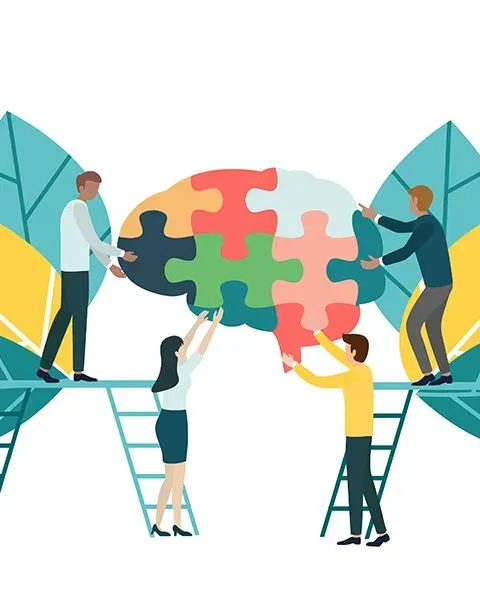
Support & Solutions for the Physician Mental Health Crisis
Long before the pandemic, doctors faced their own mental health concerns. Learn what’s been done — and what’s needed — to improve access to help.
May 27, 2021
Struggling With Your Mental Health? You’re Not Alone.
Each year, one in five U.S. adults experiences mental illness. And there’s evidence to suggest career choice could influence your mental health status. Physicians, for example, experience higher rates of suicide when compared to other professions. Yet, this same group is less likely to seek mental health treatment.
Sarah McVay, a clinical psychologist with Providence, says external pressures only compound the problem.
“We often see images of doctors in superhero capes, which suggests we expect them to be invincible,” says McVay. “While it’s important that we show physicians that they are respected and honored, we have to be careful we aren’t adding extra pressure and setting them up for failure.”
It’s important, McVay says, to increase social support systems and eliminate the stigma and barriers to seeking mental health treatment.
“Empathizing with one another about the impact the medical profession can have on mental health can be reaffirming,” McVay says. “It lets you know it’s ok to have the feelings you have.”
McVay encourages you to give yourself — and one another — permission to express mental health concerns and seek appropriate treatment. She acknowledges, however, that asking for help and seeking treatment isn’t as simple as it sounds for multiple reasons, including how it may be perceived.
Implementing System-level Changes to Eliminate Stigma
Many physicians place the care of others above care for themselves. This reality was made much more visible during COVID-19. Others are taught that stress is just part of the job. And for many, there’s a genuine fear about how their medical career could be impacted by seeking treatment.
“Physicians — just like anyone else — should feel safe and free of shame when seeking mental health treatment,” says McVay.
Licensing and confidentiality concerns prevent many physicians from seeking mental health treatment — or force them to use out-of-network providers or pay out of pocket to avoid using their own health benefits.
The American Medical Association (AMA) is pushing for changes that would eliminate the stigma around physician mental health treatment and encourage greater access to care. In 2018, the group called on state medical boards that still ask questions about applicant health to use language recommended by the Federation of State Medical Boards.
With changes in place or on the horizon, McVay encourages physicians to take steps toward normalizing conversations around mental health.
Recognizing the Need for Mental Health Care
“Physicians are great at identifying problems with their patients but don’t always do the best job at recognizing their own health concerns,” says McVay. “When they do, they should ask themselves, ‘If I were talking to my patient, what would I say to them?’”
And, says McVay, taking care of mental health benefits overall health.
“If you are not feeling well emotionally, it can affect many other aspects of your life, including relationships and work,” says McVay.
There are well-known physical and emotional signs of depression or anxiety, including decreased energy, sleep issues, racing heart or feelings of panic, sadness or hopelessness. But more specific work-related symptoms could also point to burnout or mental health concerns.
Symptoms of Burnout Include:
- A negative outlook, cynicism that often leads to a resistance to going to work.
- Anxiety and low morale, causing you to lose the spark you once felt or doubt your own abilities.
- Decreased sense of accomplishment and pessimistic view of the future.
- Fatigue and disrupted sleep.
McVay says there are many ways to address mental health challenges. Depending on your symptoms, you may benefit from medication, therapy or a combination of both.
There are also many apps or virtual tools great for developing self-care and coping techniques, including:
Headspace: This app offers articles on a variety of coping topics. Headspace, which offers some free content and free trials, also includes meditation training, and tools to support better sleep and reduced stress and anxiety. A subscription is required to unlock all Headspace resources.
Calm: This app includes tools for meditation, sleep and relaxation. Calm offers some of its resources for free. A subscription is required to access all content.
Mindfulness Coach: This free and publicly available mobile app was developed by The National Center for PTSD of the U.S. Department of Veterans Affairs. Mindfulness Coach helps those interested in learning about and practicing mindfulness.
Additional Resources Available to You
If you feel you need help with your mental health, be sure to check your employer’s benefit offerings. Many offer a certain number of free therapy sessions. Your employer may also have a confidential employee assistance program, which can be a great place to start.
The AMA has also created a list of self-management tips to help physicians manage their mental health during COVID-19.
“We all know the drill when we fly,” says McVay. “We’re told to put our mask on before assisting others. Physicians should remember this when it comes to their own mental health. It’s important that they prioritize themselves so they can care for those who need them.”


